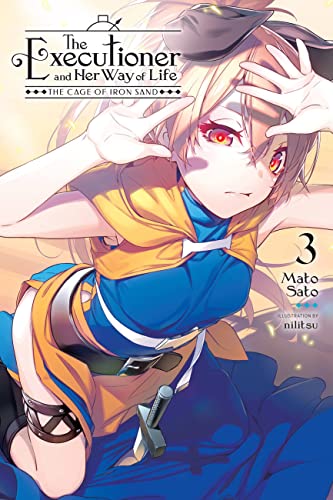By Mato Sato and nilitsu. Released in Japan as “Shokei Shoujo no Virgin Road” by GA Bunko. Released in North America by Yen On. Translated by Jenny McKeon.
There is a famous quote (actually he said it a number of times) by Anton Chekhov about dramatic principles. One of the quotes says “If in the first act you have hung a pistol on the wall, then in the following one it should be fired. Otherwise don’t put it there.”. This is a perfectly fine dramatic tenet to use, and I have no real issues with it. That said… you still need to write something OTHER than the pistol hanging on the wall. You can’t just have 90 minutes of ‘pistol on the wall, la de da’ and expect the audience to stay invested. In case you’re wondering where I’m going with this, the 5th volume of The Executioner and Her Way of Life does have some guns go off near the end of the book. But the first half of this volume may be one of the most boring I’ve seen in Japanese light novels, as everyone walks around aimlessly, reiterates what we already know, and waits for Menou to have some revelations about herself.
Everyone’s arrived at the Holy Land. Flare has taken Akari, put her in an ivory tower, and given her an existential crisis to keep her busy for most of the book. Momo and Ashuna arrive there, and have some warmed-over banter before Ashuna promptly exits the plot after seeing a future plotline. Momo is, to her surprise, taken in by the Archbishop and put to work with Hooseyard, who is a summary of all the “naive but nerdy” glasses girls in anime. Manon, Pandaemonium, and Sahara have arrived to wreak havoc. And Menou has arrived to fight Flare and lose, because she knows that’s going to happen. The problem is that she’s right for the wrong reasons. Something she figures out when they fight and it becomes clear that Menou has surpassed her master… in all ways but one.
The book turns around, as I said above, once Menou has a horrific realization: she’s only killed strangers she barely knew, and when she tries to kill someone close to her, like, say, Flare… she can’t do it. In other words, despite forcing herself into the role of a “villain”, she has empathy. Surprise! That said, it is pretty dramatically satisfying, and I enjoyed her burst of hysterical laughter. Akari has the misfortune of spending most of the book in a state of shock after realizing that if Menou dies, and she has to rewind time again,. she’s probably going to start losing her memories of her time with Menou, which nearly destroys her. Of course, there’s an obvious answer to this for both of them, one that Flare (who seems to be trying to commit suicide by cop throughout this book – Menou is the cop) is trying to hammer home. By the end of this book, we’ve finally moved past “I’m going to kill Akari/Only Menou can kill me”, and it will be interesting to see where things go next, especially after seeing the last few pages, which confirm something hinted since the start of the series.
I’ll keep going with this, because I want to see what happens to the characters. But “writing style” is not a reason anyone should read this series, and it makes the front half of this volume sheer murder.


